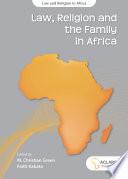
Law, Religion and the Family in Africa
The family is a crucial site for the interaction of law and religion the world over, including Africa. In many African societies, the family is governed by a range of sources of law, including civil, constitutional, customary and religious law. International law and human rights principles have been domesticated into African legal systems, particularly to protect the rights of women and children. Religious rites and rituals govern sexuality, marriage, divorce, child-rearing, inheritance, intergenerational relations and more in Christianity, Islam and indigenous African custom. This book examines the African family with attention to tradition and change, comparative law, the relation of parents and children to the state, indigenous religion and customary law, child marriage and child labour and migration, diaspora and displacement.
- ISBN 13 : 1991201575
- ISBN 10 : 9781991201577
- Judul : Law, Religion and the Family in Africa
- Pengarang : Dr M Christian Green, Dr Faith Kabata,
- Kategori : Law
- Penerbit : African Sun Media
- Bahasa : en
- Tahun : 2021
- Halaman : 405
- Google Book : https://play.google.com/store/books/details?id=pdteEAAAQBAJ&source=gbs_api
-
Ketersediaan :
... Islamic law.90 Since the Maliki school puts the age of marriage at 17, it can be argued that there is no basis for anyone in the northern part of Nigeria to marry a girl below that age. However, it can be countered ... Islamic law?


